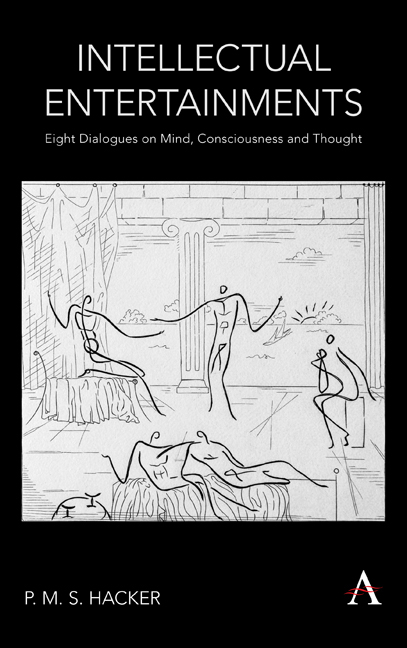Book contents
- Frontmatter
- Dedication
- Contents
- Preface
- Acknowledgements
- Section 1 Two Dialogues on Mind and Body
- Introduction
- First Dialogue On the Nature of the Mind
- Second Dialogue The Mind and the Body
- Section 2 Two Dialogues on Consciousness
- Section 3 A Dialogue on the Objectivity or Subjectivity of Perceptual Qualities
- Section 4 Two Dialogues on Thought
- Section 5 A Dialogue on Ownership of Pain
Second Dialogue - The Mind and the Body
from Section 1 - Two Dialogues on Mind and Body
Published online by Cambridge University Press: 06 December 2019
- Frontmatter
- Dedication
- Contents
- Preface
- Acknowledgements
- Section 1 Two Dialogues on Mind and Body
- Introduction
- First Dialogue On the Nature of the Mind
- Second Dialogue The Mind and the Body
- Section 2 Two Dialogues on Consciousness
- Section 3 A Dialogue on the Objectivity or Subjectivity of Perceptual Qualities
- Section 4 Two Dialogues on Thought
- Section 5 A Dialogue on Ownership of Pain
Summary
Protagonists:
Frank Craik: a contemporary American neuroscientist, casually dressed in jeans and pullover, with open-necked shirt. He has a marked American accent.
Jill: a philosopher in her early thirties, dressed in an elegant but informal manner.
Richard: a middle-aged Oxford don of the mid-twentieth-century, dressed in cavalry twill slacks, waistcoat and tie, and well-cut jacket.
Alan White: a small man, dressed in a dark blue jacket and grey slacks, with a light blue shirt and a bow tie. He speaks with a slight Irish accent.
Peter Strawson: dressed in a well-worn tweed suit and a woollen tie. He has a rather deep voice, speaks slowly and very deliberately.
The setting is a garden in Elysium. The sun is shining. A rich verdant lawn is surrounded by flower beds and flowering bushes, with a grove of magnificent trees behind. Beyond, there is a large lake, and in the distance, high mountains. Five comfortable garden chairs are placed in the shade of some trees. There is a low table on which are placed a wine decanter and glasses, three of which are half full. Richard, Jill and Frank are deep in conversation.
Frank: OK. I agree that our discussion with Aristotle showed us why dualism and crude materialism are wrong. He made clear what the mind is, but he still left us with the problems we started with.
Jill: What problems do you have in mind, Frank?
Frank: Why, the problems that Richard raised: why do we speak of having a mind? And then there is the further question which we didn't even have time to discuss with Aristotle: why do we speak of having a body?
Jill: Yes. We really must talk about that. I have a body, just as I have a mind. But what exactly is this relation of having? And what exactly is involved in having a mind and a body?
Richard: Well, at least this much became clear: Having a mind is to be compared with having powers and abilities, with having talents – not with having a house or a car. And doing something with one's mind is not like doing something with a hammer or a screwdriver, but like doing something with one's talents. It is exercising one's intellect and will. And what it is that has a mind is obviously the living human being.
- Type
- Chapter
- Information
- Intellectual EntertainmentsEight Dialogues on Mind, Consciousness and Thought, pp. 33 - 54Publisher: Anthem PressPrint publication year: 2019

